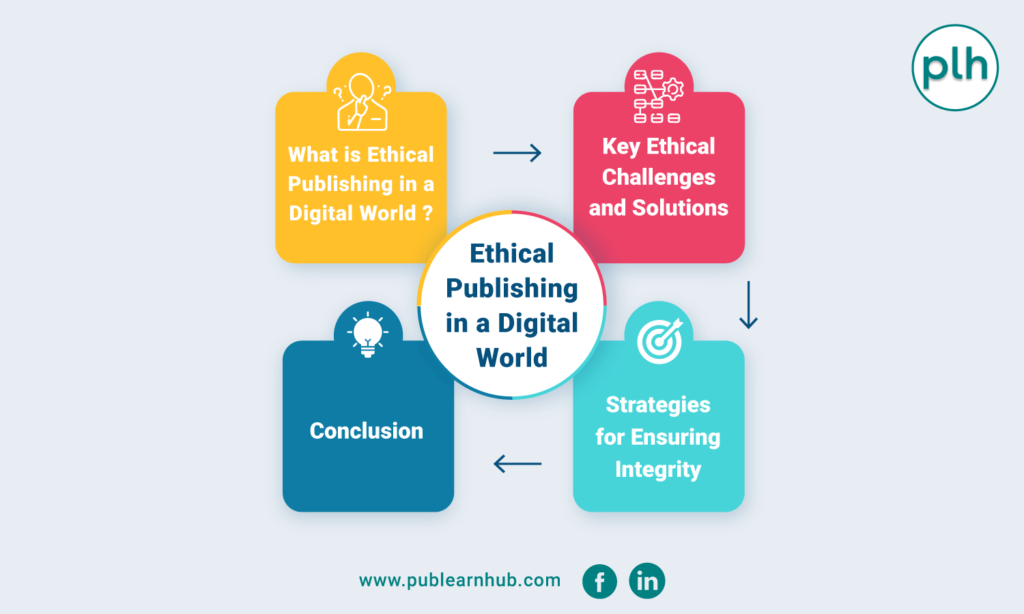Ethical Publishing in a Digital World
Reading time - 2 to 3 minutes
Introduction
The digital age has brought unprecedented opportunities for academic publishing, enabling the rapid dissemination of knowledge and fostering global collaboration. However, it has also introduced complex ethical challenges. Issues such as plagiarism, data fabrication, predatory publishing, and the misuse of AI tools have raised significant concerns about maintaining the integrity of scholarly work. This article explores the ethical challenges in academic publishing and outlines strategies to address them effectively.
Key Ethical Challenges
1. Plagiarism
Plagiarism remains a pressing issue in academic publishing, exacerbated by the ease of copying and pasting in the digital era. The availability of online research has made it easier for unethical authors to replicate work without proper attribution.
Solution: Advanced plagiarism detection tools like Turnitin and iThenticate are invaluable for identifying and preventing instances of plagiarism. Journals and publishers must enforce strict guidelines and educate authors about the importance of originality.
2. Data Fabrication and Falsification
Manipulating data to achieve desired results undermines the credibility of research and can have far-reaching consequences, especially in fields like medicine and public policy.
Solution: Transparency initiatives, such as the requirement for raw data submissions and the use of data verification tools, can deter misconduct. Platforms like Dryad encourage researchers to share their datasets, promoting openness and accountability.
3. Predatory Publishing
Predatory journals exploit the open-access model by charging authors fees without providing legitimate editorial and peer-review services. These journals often lack transparency and publish low-quality or fraudulent research.
Solution: Researchers should consult resources like the Directory of Open Access Journals (DOAJ) to identify reputable open-access publishers. Educating early-career researchers about the risks of predatory publishing is equally important.
4. Misuse of AI Tools
While AI tools can enhance research and writing processes, their misuse—such as generating fake papers or manipulating results—poses ethical dilemmas.
Solution: Clear guidelines on the acceptable use of AI in research and publishing are essential. Publishers should adopt policies to ensure AI-generated content is disclosed and appropriately cited.
Ensuring Integrity in Academic Publishing
To uphold ethical standards in academic publishing, stakeholders must adopt a multi-pronged approach:
- Educational Initiatives: Providing training on research ethics and responsible publishing practices is crucial, especially for early-career researchers.
- Technology Adoption: Leveraging AI and machine learning tools to detect ethical violations and enhance transparency can help maintain publishing standards.
- Editorial Oversight: Strengthening the peer-review process and ensuring that reviewers adhere to ethical guidelines is vital.
- Community Collaboration: Encouraging collaboration among researchers, publishers, and academic institutions fosters a culture of accountability and trust.
The Path Forward
As academic publishing continues to evolve in the digital world, addressing ethical challenges must remain a priority. By embracing technology, enforcing rigorous standards, and fostering an ethical culture, the academic community can ensure the integrity and credibility of scholarly work.
Conclusion
Ethical publishing is the cornerstone of credible research and knowledge dissemination. In the digital era, where the boundaries of academic publishing are continually tested, stakeholders must work together to navigate challenges and uphold the highest standards of integrity. By doing so, we not only preserve the trust in academic literature but also pave the way for a more transparent and equitable future in scholarly communication.
